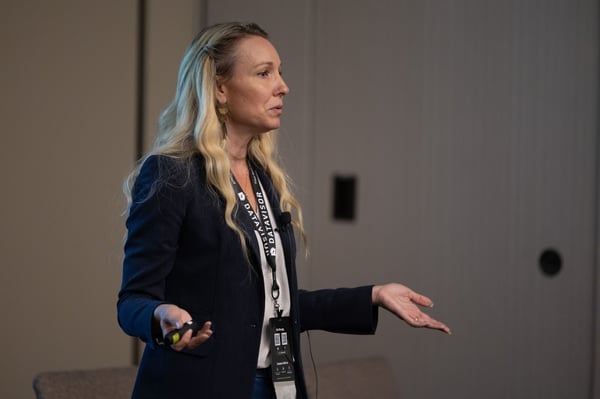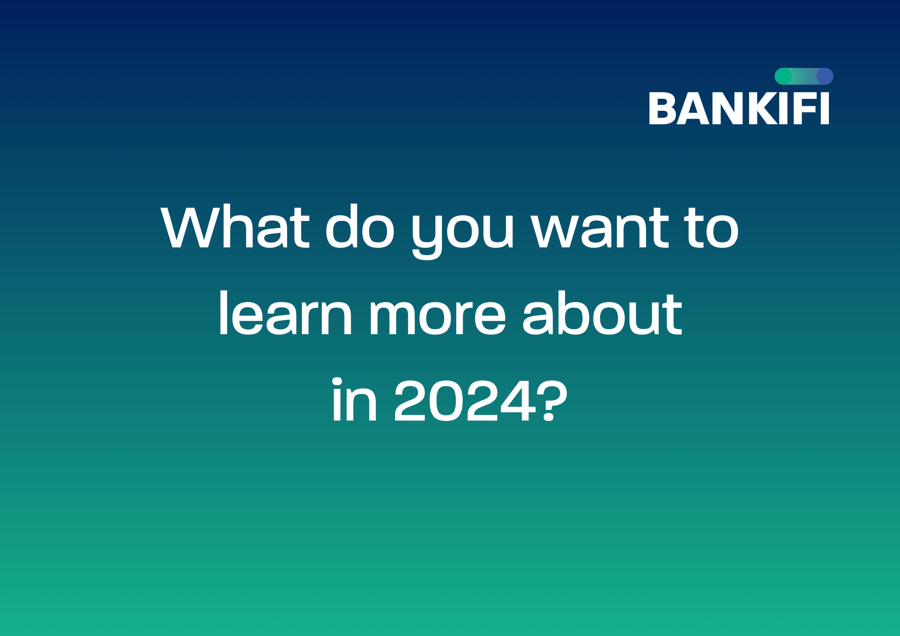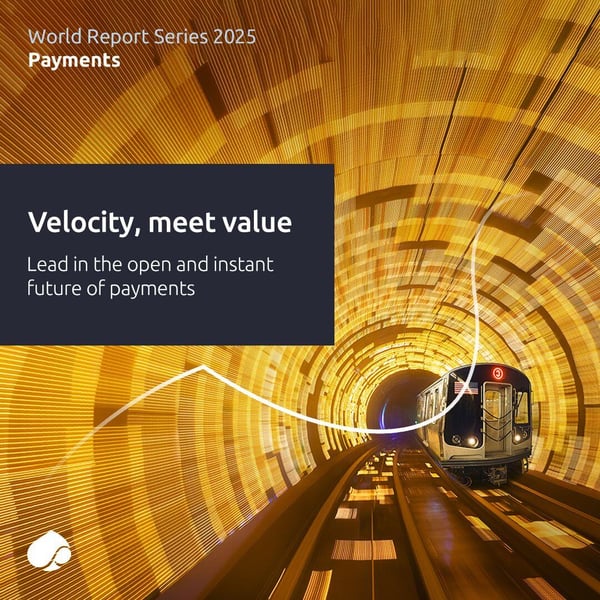With the New Year behind us, it's time to delve into the world of financial services and uncover the trends and predictions that will shape the business banking industry in 2024.
Our team of experienced industry veterans from all corners of the globe are ready to share their insights and forecasts for the next 12 months. So, let's dive in and discover what they have to say about the year gone by and the exciting developments on the horizon.

What have been the stand-out highs and lows in financial services in 2023?
"Financial institutions are really stepping up to serve their small businesses. They have recognized that this is an underserved market and are doing their research and due diligence to offer services for small businesses that can really make an impact in that business growing and thriving. And financial institution’s aren’t just doing this through technology. They are donating unused branch spaces for small businesses to co-work and for community to gather. They are offering education for their small businesses like education and advise on taxes. All these touchpoints deepen the relationship of the small business with their institution and to their mutual community.
While there are so many positive’s financial institutions are trending towards, there is still a lot of Learning going on vs. Execution. Banks and credit unions are some of the more conservative businesses our nation has, and they are for good reason (ahem Silicon Valley Bank), but the time to execute is imminent. Financial institution’s must step up in creative and meaningful ways to serve their small businesses."
Lindsay Hodges | Director of Product Management and Client Success

"On the low side, we were all given a stark reminder that financial services are not immune to wider economic or social behaviours. Some of the technology advances banks have unintended consequences, such as leaving them vulnerable to bank runs.
On a much happier note, banks in general have shown great resilience and adaptability to continue to meet capital requirements and regulatory commitments. By contrast, some of the competition positioning themselves as a challenge to incumbents have been found wanting in some areas of regulation."
Nick Reid | Head of Strategic Growth
"The turbulent economic times have certainly had their impact on the financial services industry and the small business community alike. A lot of businesses have been in survival mode and were actively looking for support from their bank. More than ever, solving small business’ problems in an effective manner is top of mind in financial services. Convenience and efficiency is also important but small businesses need the solutions to have an actual impact like improving their cash flow or having greater insight into the financial health of their business.
On the technology side, open banking adoption has accelerated significantly over the last year and is being adopted in more and more countries, and with PSD3 on the horizon, the shift to open finance has started already.
It will be interesting to see how unlocking additional data flows will fuel innovation. At the same time, we see an explosive growth in generative AI and the financial services sector is exploring the potential of this technology."
Marijke Koninckx | Chief Product Officer
How can banks improve their small business banking operations in 2024?
"Banks are starting to have two very different models of service. There is the traditional community bank that has branches where their customers can work face to face with their bankers in addition to the technology and tools they provide in a digital format (web, mobile apps). There is also the upcoming and very popular neo banks, with no branches and robust technology. Their belief is that with the right tools, the relationship naturally deepens. And neither model is incorrect. Both are still serving their specific markets well. Regardless of the model of service, there is no dispute that banks must implement technology that makes a difference for small businesses and also helps the bank bring in deposits and provide capital."
Lindsay Hodges | Director of Product Management and Client Success
"In the US, increasing small business market share and increasing the value of small business deposits are the top two priorities for Financial Institutions (57% and 37% respectively). Yet the same group of Financial Institutions respondents cited competing for a slice of the small business banking market (63%), finding new small business customers (49%) and attracting small business deposits (48%) as their top three challenges1. This suggests an obvious opportunity for Financial Institutions with a differentiated small business offering focused on acquisition of small business deposits.
The focus on deposits is no different in Europe, but I find the stats on UK small business finance really interesting. Challenger and specialist banks accounted for £35.5bn of business lending in 2022, exceeding lending by major UK banks for the first time, with the new high of £22.1bn in the smaller business asset finance market especially eye-catching2. Now the anomaly of Covid-19 business lending programmes are starting to abate, it’s interesting who businesses, especially smaller ones, are turning to for finance. When you scratch deeper, it presents opportunities for lenders of all sizes, not just challenges."
Nick Reid | Head of Strategic Growth

How do you anticipate the role of challenger banks and digital-only neobanks evolving in 2024 and how might they disrupt or enhance traditional financial services?
"There is real growth in this sector, and it can’t be ignored that small businesses are working with these bank challengers because of the robust digital services they provide. I don’t see the neo bank as taking over the community institutions, but rather being a parallel offering to the more traditional bank.
Both are very valid in the marketplace, but if the traditional bank doesn’t step up a bit in offering meaningful technology and products, there is a real risk of losing that relationship and with the neo bank waiting in the wings, it’s a hard win back."
Lindsay Hodges | Director of Product Management and Client Success
Nick: In retail, the market is flooded with neobank propositions, to the extent that it’s difficult to see any differentiation. There are one or two notable exceptions who have or are transcending into mainstream, but otherwise each new entrant looks more or less the same. They have undoubtedly disrupted and enhanced financial services by raising the bar for incumbents, but not to the extent they represent a competitive threat.
In business, neobanks have undoubtedly made an impression amongst start-ups. In the UK, they have grown overall microbusiness BCA market share from 1% to 5% between 2016 and 2020. This growth is primarily at the expense of the Big 4 UK banks, who saw their share drop from 79% to 73% in the same time period. Digital challengers have grown their market share of start-ups across the time period from 2% to 23%, whilst the Big 4 have seen theirs drop from 78% to 57%3.
My suspicion is that incumbent banks are not feeling a significant financial or competitive threat because these figures do not tell us anything about deposits, which are undoubtedly going to be less chunky for brand new businesses. Furthermore, our own research at BankiFi tells us that it is not uncommon for small businesses to use digital challengers as secondary accounts for an area of specialty such as FX.
Finally, one of the most common and recurring bits of feedback from our own bank clients and small research is that small businesses really value human interaction with their bank, which has produced the ‘phygital’ adjective in financial services."
Nick Reid | Head of Strategic Growth
"Neobanks have certainly raised the bar when it comes to rethinking the value proposition for SMEs. But traditional financial institutions are catching up. At the same time, the market as a whole is shifting to an open finance model that create opportunities for banks and non banks alike.
This means that neobanks won’t be the only challengers. It will be interesting to see how this impacts the competitive landscape. When financial institutions get their embedded finance strategy right, this could actually work in their favour."
Marijke Koninckx | Chief Product Officer

What have our own bank partnerships taught us in 2023?
"That what we are doing at BankiFi matters. By giving banks and credit unions the opportunity to help their small business customers get paid faster and easier and insights into their cash flow, we are offering technology that is meaningful in the day-to-day life of a small business. And when a financial institution offers something meaningful, the relationship becomes one of mutual benefit.
Small businesses grow and the community institution gets to help them grow by providing more capital. It’s a win-win that goes beyond the small business and the bank. It touches the community they operate within. When businesses grow, employment increases, community programs are more prevalent and families thrive within their communities."
Lindsay Hodges | Director of Product Management and Client Success
"The rapid (by financial services standards) change in the interest rate environment has presented challenges but these are overweighed by the opportunity. Whilst deposits have always mattered, it has been nearly two decades since customers and their deposits have been as important as they are now. For those with inherently bigger balance sheets, it has sharpened focus on the initiatives that maximise return on equity. "
Nick Reid | Head of Strategic Growth
"Effective solutions for small businesses are a very sticky value proposition and will not only improve the relationship between a bank and its small business customers, it also is a powerful acquisition tool.
By bringing the end to end financial workflows into the bank’s channel, the banks can again become their SME customers’ first choice when it comes to managing their finances.
By doing so, banks also get access to a very rich and comprehensive data set that allows them to get much greater insight into their business clients and as a result, they’re able to better service this customer segment."
Marijke Koninckx | Chief Product Officer

What key learnings do you think it's important the banks take forward next year?
"Listening is much more productive than just reading reports and analyzing data. Getting out into the small business community banks serve and understanding what the real needs of those small businesses are, is critical. Banks and credit unions should consider setting some budget aside in the New Year to work with an independent contractor or work to build up the bank’s internal marketing and service teams to get “boots on the ground”.
By hosting small business events, interviews, classes, etc. the bank gains a perspective on small businesses that they just can’t get in just analyzsing data and reading market studies. The human connection is still very real and will make a real difference in how to execute your strategy."
Lindsay Hodges | Director of Product Management and Client Success
"The tech part of Fintech has learned the hard way this year that it must be able to clearly articulate the problem being solved and generate profitable revenue. This must be front of mind for financial services when considering innovation. As examples, the US and Canada are a step closer to Open Banking than they were at the start of the year, and instant payments will grow in the next two years, especially in the US and in the Eurozone. There is a danger of such innovation resulting in the ‘so what?’ moment for some stakeholders. It is the industry’s responsibilities to show financial services the opportunity this brings to them and their customers."
Nick Reid | Head of Strategic Growth
"Financial services have traditionally focused on security and compliance. This remains essential for the industry, and may even become more important because more and more data will be entrusted to financial institutions. In the context of the uncertain economic times, trust will be of the utmost importance and this works in the banks favour and does give them a competitive edge over non financial institutions when it comes to becoming the primary financial partner for the small business community. Fintech solutions have focussed a lot on ease of use and financial institutions have understood that they need to step up and they are actively improving their offerings. We are starting to see embedded finance shifting from vision to reality, which is the foundation of the banking channel of the future."
Marijke Koninckx | Chief Product Officer

What are your hopes for business banking in 2024?
"Banks and credit unions need to move from Listening to Executing. The time is now. If meaningful technology isn’t offering through the small businesses institution; products that offer invoicing, collections and basic business reporting like Cash Flow Forecasting, they will quickly become more irrelevant to the business.
Non-banking providers like Intuit have already taken a big share of this market from banks, and if banks don’t have solutions in place in the next 12 months, I fear the non-banking providers will win."
Lindsay Hodges | Director of Product Management and Client Success
"The regulators have made moves to protect consumers and businesses in recent times. In the UK, Consumer Duty has been one of the most impactful pieces of financial services regulation.
Banks are already being asked go above and beyond to protect customers in areas such as APP fraud. I hope this becomes a more shared, cross-sector responsibility and other sectors are held equally accountable."
Nick Reid | Head of Strategic Growth

What are your predictions for 2024?
"When it comes to effective and efficient financial services, real time, 24/7 payments and open finance are crucial and the wealth of initiatives in this space prove that the industry acknowledges the need for a real time, open and robust infrastructure. Adoption of real time payments will accelerate and various initiatives around interoperability will make this even available for cross border payments.
With PSD3 being drafted and initiatives like the SPAA (SEPA Payment Account Access) scheme, the wheels are also set in motion to improve the open banking foundations that have been laid by PSD2.
It is clear that embedded banking and open finance are here to stay and will continue to develop further in the next months and years. It also does unlock new sources of data and it will be interesting to see how technologies like generative AI will be leveraged to unlock the full potential of these rich data sets."
Marijke Koninckx | Chief Product Officer
"Firstly, I see no end to the consolidation taking place in financial services and Fintech.
For businesses, cashflow will continue to be king. All financial products and technology which optimise cashflow and inject growth (against a background of abject economic growth) will prevail.
As a tech enthusiast, I find the consumer retreat to cash as a budgeting tool to deal with the cost of living crisis really depressing. Our industry surely will do more to help consumers better budget – I’m talking about tools that go beyond just helping people to identify their recurring spend on gym memberships, streaming subscriptions etc. Open Banking and other open sources of data present an opportunity here – I applaud the Apple Wallet implementation of Open Banking. It’s almost the opposite psychology to BNPL: 'are you sure you want, need and can afford to make this purchase?'"
Nick Reid | Head of Strategic Growth

We want to hear from you
Here at BankiFi, we are committed to delivering engaging and innovative content to our financial services community. We value your input and want to know which topics you'd like us to cover in our upcoming webinar series next year.
Take a moment to click the button below and select the subjects that interest you the most. We look forward to receiving your response and crafting content we can all get excited about in 2024.
.png)


.png?width=600&name=Rectangle%20316%20(3).png)
.png?width=600&name=Webinar%20assets%20(1).png)

